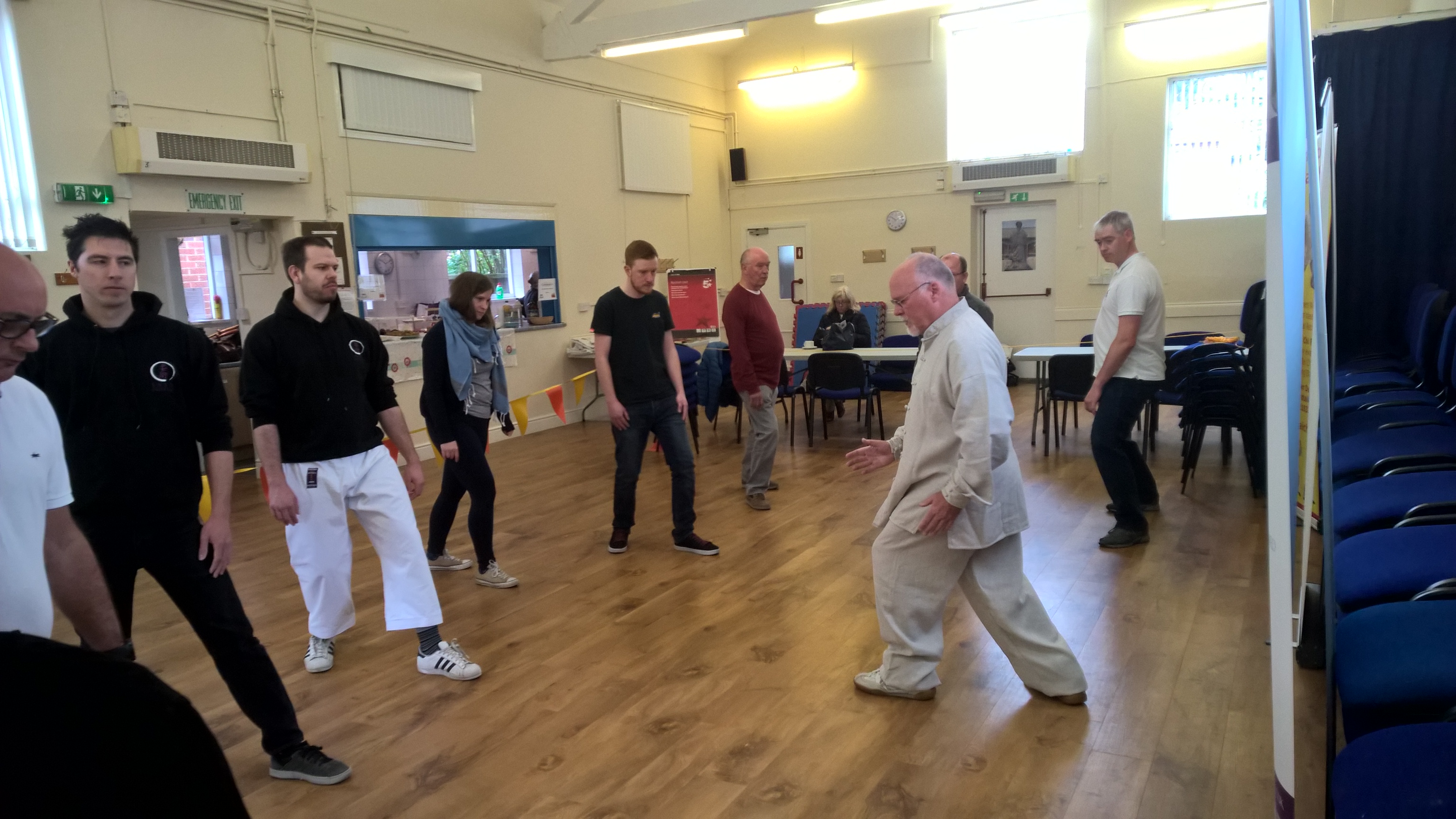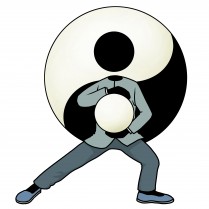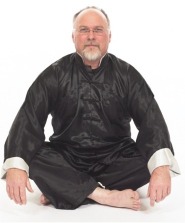This came up in conversation recently with my teacher Karel Koskuba in discussing how one progresses in Tai Chi – this constant process of practicing and noticing – paying attention to small things and following them – until suddenly there is a realisation of significant change and that something previously impossible is now relaxed, natural – almost easy.
A process which seemingly continues in successive cycles……………….until it doesn’t.
When I practice alone I have the freedom to work without a teacher – that is to say without anybody actively correcting me – I have the freedom to make mistakes and to try “the wrong ” way of doing and sometimes this really pays off. Because I paid attention at the time all my teachers and lessons are memorised inside me and by going “off piste” I am not questioning them but rather I am questioning my original interpretation of what I thought they were saying or doing – it is amazing how often I got it wrong all those years ago and now suddenly realise what it was they were really trying to teach.
What can I say I am a slow learner!
I find it a bit like being lost without realising it because everything is so familiar, so habitual, in such a comfortable rut – I need to look around and try a new direction in order to find the right path again. We all get delusional sometimes and just doing the same old thing yields the same results – which generally can be a good thing but we can easily veer off in without realising it so it can be worth shaking yourself up and trying some different things. Remember the lesson and try to look for different possibilities than the one you have been focusing on.
The snowglobe of life needs shaking up occasionally so it can settle into a new pattern.
Well with all this working from home I find that the urge to go outside in our garden occurs a few times a day – often to sit with a coffee, but increasingly to do a Tai Chi form maybe 2 or three times a day – which means about one to one and a half hours a day of practice. We are lucky to have quite a large area of lawn but I am really only using a patch about 20 feet by 10 – which is getting very trampled – so not so much grass to cut then!
Working on my own I can go at whatever speed I like – and that is getting slower and slower – and co-incidentally lower and lower.
So my practice has taken on a sort of “do it when I feel like it” routine and I am enjoying it that way – and finding more and easier movement in some unexpected places.
Good luck with your own “enforced” practice and I hope you are all well – I look forward to seeing you when we come out the other side.
Well you don’t need me to tell you that group practice in the park has been banned – a shame really since those who came on Sunday and Monday had no problem maintaining appropriate social distances.
A number of people have suggested online classes – but honestly I really don’t get it. They are great for teachers who do it for the money and need to keep their business going and I am sure that for many exercise classes they are satisfactory. For Tai Chi however and for me personally the interaction between myself and my students is vital to both enjoying the class and to its effectiveness. I would rather that we all take the opportunity in private practice to pay attention to our movement using the exercises and routines that we can remember – and especially the ones that we enjoy.
Where your memory needs a little jogging then please see my previous post for links to useful videos. Even if you don’t recognise their forms it is a valuable and enjoyable way to pass some time by watching people like Chen Xiaowang, Chen Bing or Chen Yu whatever they are doing – many of us find that with time something seeps into our understanding by just watching them and then we can study closer and gradually start to have a glimmer of understanding of what they are doing and how.
If anyone has any questions please do e-mail me or Whats App video call and I will try to help – of course I realise that many of you have already formed friendships and are in touch so I urge you to incorporate your Tai Chi into friendship interactions.
contact Ian Deavin on 01462 621970. Mobile: 07860 218334
e-mail: [email protected]
Hi – if you are not able to join us at the Diggswell Park/STMA practice then you may be interested in our online resources – please see here for loosening exercises plus of course any that you remember from more recent classes. Also see here for the first part of the form – obviously if you know more then please practice what you can remember.
You could also take a look at Chen Bing here
or look at Chen Xaowang here
or see Chen Yu here
Now all the halls are closed I am going to give it a try with some personal outdoor training, weather permitting – if you would like to join me there will be no charge and you will be welcome on your own responsibility – which includes “social distancing”.
There are a couple of possible areas at Diggswell Park which is the large grass park adjacent to the STMA in Shefford – one is next to the picnic tables which is convenient and another a bit more remote/secluded – if you look from the car park to the left across the field on the left is the picnic area and beyond is a line of trees – at the end is another nice spot.
I will be there on Sunday at 3.00pm and again on Monday at 2.30pm probably for an hour each time – although if I feel like it I may stay longer – or leave earlier if the weather determines! I am thinking of wearing layers and taking a flask for myself as it may well be cold.
I will just be doing usual exercises and form, much as I have experienced in the parks of China.
Unfortunately indoor venues are now closed – all are concerned quite rightly about their duty of care. I am therefore considering the possibility of running one or two outdoor classes – weather permitting of course – maybe adjacent to the Shefford STMA where there is a quiet area which I have used in the past.
Perhaps a class on Sunday afternoon and a class on Monday afternoon. Failing that I could run small classes outside my house.
No charge.
It is a question of mindset – I have noticed that society seems split 50/50 between those with one mindset and the rest. One mindset says I am happy to manage risk myself and to take responsibility for my personal choices – the other seems different.
Please e-mail me if you are interested to attend [email protected]
Paying attention is probably the single most important aspect of learning Tai Chi at any level. Paying attention on a forensic level is vital but extremely difficult and something few in present society are comfortable with – it is a skill in it’s own right, from observing the teacher to observing ourselves and then to observing others. Tai Chi is the most sophisticated thing I have ever come across, also the most paradoxical and it just may be that attention is the most paradoxical part – it may be that the whole point of all Tai Chi practice is to encourage and channel us into paying attention to reality.

I am sorry to have to cancel the Tai Chi Festival on April 25 due to the present Corona virus situation. I appologise for any inconvenience but hope to run it later in the year once the situation clears.
In the meantime best wishes to you all and please watch this space for other news.

Seen world-wide it is observable that special interest groups have their own mores, practices, language (jargon) and social norms which are often quite foreign to outsiders who occasionally enter them, either out of need or curiosity. We see this in our interactions with the professions of medicine, teaching, law and so forth – when visited at need these micro-cultural schools of expertise justify high fees often sustained by this very separateness and the enforced barriers to understanding which they promote.
Elsewhere, we see a similar situation with areas of personal interest – clearly the one considered here is that of martial arts.
Once we understand Tai Chi/martial arts as a specialist niche culture like the professions, then we can begin to expect some challenging issues in comparison to mainstream culture. Certain practices for example, or ways of perceiving human interaction are just as “foreign” as any medical training (complete with dissections, intimate examinations, drug ingestion, etc) or legal conversation replete with tortuous thought experiments and Latin notation.
Compare for example with dance and its suppressed sexuality (a vertical expression of a horizontal desire), its intellectualised definition of physical expression and its pre-linguistic emotional expression through wholly committed physical action. Consider also the physical, psychological and linguistic worth of sports.
So, when you join a Tai Chi class consider that you have entered a very old sub-culture based on millennia-old ideas and practices, many once common but today lost except to some specialist areas. Perhaps consider what it means to join such a group and allow for the fact that you are the (albeit welcome) outsider who needs to make allowances for the conflicts which may come about from your own expectations. Even for those of us with many years as part of this sub-culture we continue to find that the thinking and habits we were brought up with continue to hold us back in developing our Tai Chi skill set.
So we are all beginners and all seeking to find our place in this world of multiple sub-cultures.







